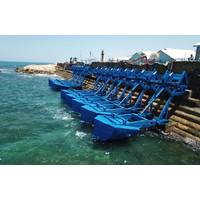OPEC's Meeting this Week in Vienna
The Organization of the Petroleum Exporting Countries meets on Friday in the Austrian capital, with delegates saying the group will leave its oil output policy unchanged.
Following are comments from OPEC ministers and other officials in connection with the talks:
Iraqi Oil Minister Adel Abdel Mahdi, speaking at the OPEC International Seminar in Vienna on Wednesday. "The equitable (oil) price will be between $75 and $80."
"There is an optimism and general acceptance with the current situation," he said when asked whether there is consensus among OPEC to keep the group's output ceiling unchanged.
"Iraq is always with the unity of OPEC and its fight for the interests of its members and the stable interests of the oil industry."
"We don't want volatile prices every day that affect the budgets and projects ... we support a stable oil price in the interest of consumers and producers."
"(Current) prices are less than what's needed and market fundamentals are what drive prices."
OPEC Secretary-General Abdullah al-Badri, responding to a question on Wednesday about whether Friday's OPEC meeting would be lengthy:
"I don't think so. Everything is very clear."
Saudi Arabian Oil Minister Ali al-Naimi, responding to a question on Wednesday about the risk premium in oil markets and Middle East instability:
"The risk premium is there but it is very small because of supply ... The world is getting very comfortable with the risk."
On the energy outlook:
"In terms of the long-term energy outlook, the future looks very positive."
"We are currently meeting global demand and I don't see this changing."
OPEC Secretary-General Abdullah al-Badri, speaking at the OPEC International Seminar on Wednesday:
Link to Badri's speech: http://www.opec.org/opec_web/en/3037.htm
"We also welcome recent OPEC and non-OPEC discussions. I have read many reports that suggest OPEC is targeting specific non-OPEC countries or producers with its decisions. This is not true. We welcome all energies. We welcome all producers. In the current market environment, I think we can all appreciate that the challenge of maintaining the supply-demand balance and reaching price stability requires the cooperation of major non-OPEC producers. We should remember what cooperation between OPEC and non-OPEC producers achieved back in the 1998-1999 crisis."
Qatar's oil minister Mohammed al-Sada, speaking at the OPEC International Seminar on Wednesday:
"Looking at the oil market today, there are a number of reasons to feel optimistic about the general situation going forward."
"The global economic recovery is showing encouraging signs and oil demand is improving. Going by the current trend, there should be a more balanced market in the second half of the year."
Senior Gulf OPEC delegate: "There is consensus among Gulf OPEC countries, and others, to keep the ceiling unchanged," the delegate told Reuters on Tuesday after an informal meeting of the four core Gulf Arab OPEC members earlier in the day."
"Nobody wants to rock the boat. The meeting is expected to be smooth sailing."
Iraqi oil minister Adel Abdel Mahdi: "There is an improvement, yes," he told reporters on Tuesday when asked about the oil market situation.
OPEC Secretary-General Abdullah al-Badri: Asked by Reuters on Tuesday whether he was happy with the way the oil market had responded since January:
"Yes, there (are) some positive signs."
Angola's oil minister Jose Botelho de Vasconcelos: "I would like the price (to) go up, but it is not easy," Botelho de Vasconcelos told reporters on Tuesday.
Asked whether $70-80 was the right price for oil, he said: "80 maybe."
Saudi Arabian oil minister Ali al-Naimi: "The answer is yes," Naimi said, when asked by reporters on Monday whether the Saudi strategy of defending market share through higher supplies and lower oil prices was working.
"Demand is picking up. Good! Supply is slowing, right? That is a fact," he said. "You can see that I'm not stressed, I'm happy."
Asked about demand in the second half of this year, he said: "It will be better than now."
Naimi said it would take time for oil markets - still heavily oversupplied - to rebalance. "I don't have a crystal ball but it is (going) in the right direction," he said.
"This is not a good time to sell the surplus. So they (traders) have to keep it and as the contango goes down and they see the backwardation coming forward they will hang on to it.
They are not going to dump it on the market," Naimi said.




